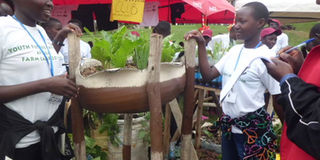Students find agribusiness worthy side hustle in school

Students explain how they maintain vegetables that they cultivate. To make sack and tyre farms, the students dig up soil, refine it by sieving, add manure to it and thoroughly mix it. PHOTO by Lominda Afedraru.
What you need to know:
With funding and training, students can create own source of income while still at school as opposed to waiting for after school to seek jobs, writes Lominda Afedraru
If you are a youth, you are damned if you engage in farming but you will equally be damned if you do not.
To be specific, urban farming as an option is very key to enabling the continuous production of food to meet the food demand for the urban dwellers.
This is an area where we have to encourage young people to join in the food production chains since majority of them think farming is dirty work meant for elderly people. Involving young farmers in urban farming leads to the understanding that, besides the lack of mechanisation, they lack the best farming practices that would otherwise increase their earnings.
But attracting and keeping young people in food production means supplying more modern and affordable farming tools and equipment to help them do the job well and more efficiently. A lot of young people see agriculture as tiresome.
There is also stigmatisation from peers and from the community who perceive those engaged in agriculture as failures.
But regardless of one’s professional background, any youth can still engage in agribusiness.
As such the annual school farm camp organised for students in various schools at Gayaza High School is one such avenue for the youth to learn skills of engaging in various agriculture initiative.
One of them is using various technologies to grow vegetables in improvised gardens in a small space.
Students from Bombo Army Secondary have taken keen interest in this type of farming which they are implementing in their school farm and in their small plots in their homes in the barracks.
On how the students balance farming and classes, Abdalaziz Asula, the head of the project told Seeds of Gold that: “Most of us live in the barracks which is congested with limited land. The best we can do is to improvise and set farms such as sack gardening, tyre garden and bottle gardening to grow various types of vegetables and root crops both at school and at our homes. This is after being sensitised at the previous school camp activities,” she narrates
Tyre design gardening
This is where you plant in old car tyres which are designed into chambers nailed on logs and filled with fertile soil. The soil is mixed with sawdust and manure which may comprise two or three stairs.
The students plant vegetables such as beetroot, spring onions, spinach and straw berry.
These are intercropped in a single garden and irrigation has to be done on regular basis twice a day; in the morning and evening when the temperature is cool. All vegetable varieties planted take three months to grow.
Bottle gardening
Here students collect water bottles and use them to set up a garden. The bottles are set at the edge of the garden on logs. The tops are nailed on
the edges of the log and it is filled with sawdust mixed with manure. In these gardens the students grow green pepper, kales and pepper mint. They also grow Russian comfrey whose leaves are used to feed the chicken to enable them lay eggs with yellow yolk.
Sack gardening
The students create a sack garden using perforated sacks that they place in an upward direction
Asula says the garden enables them to plant various vegetables in one place other than on land which is not readily available in many the barracks.
Sack gardens according to her offer their families a way to grow their own vegetables since space is limited. This not only provides a healthier diet, but also brings people closer to nature.
The progress
The students formed the Bombo Army School young farmers club comprising of 32 executive members who coordinate the farming initiative. There are more than 80 students in different classes who are members with each member given space to plant using the gardening type of their choice.
Students harvest their produce which is sold as bulk to the school kitchen department and the surrounding communities.
So far the club has Shs300,000 in the school club account. The club has a patron who is one of the teachers and is the custodian of the money. The board of the club is privileged to apply for a specific amount of money which can be invested in other farming initiatives such as poultry.
The club was started last year and it is progressing well. Asula is calling upon students in other schools across the country to embrace farming using the various gardening technologies as a means of growing vegetables as part of the school diet.




